精品---最新高三英语10套复习听力题目
- 格式:doc
- 大小:376.00 KB
- 文档页数:8
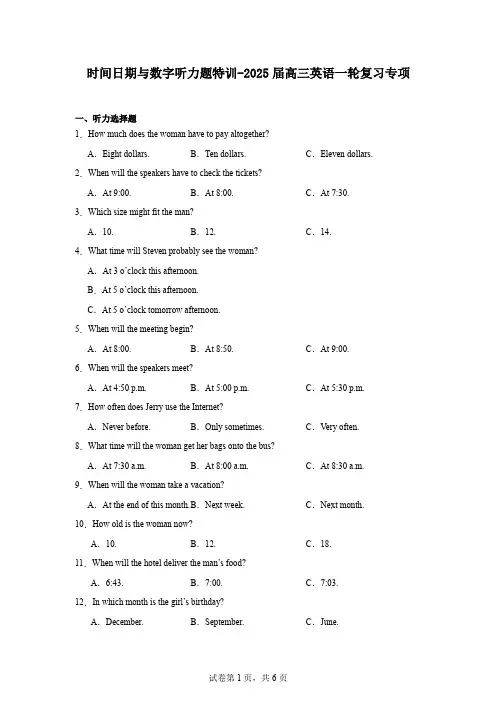
时间日期与数字听力题特训-2025届高三英语一轮复习专项一、听力选择题1.How much does the woman have to pay altogether?A.Eight dollars.B.Ten dollars.C.Eleven dollars. 2.When will the speakers have to check the tickets?A.At 9:00.B.At 8:00.C.At 7:30.3.Which size might fit the man?A.10.B.12.C.14.4.What time will Steven probably see the woman?A.At 3 o’clock this afternoon.B.At 5 o’clock this afternoon.C.At 5 o’clock tomorrow afternoon.5.When will the meeting begin?A.At 8:00.B.At 8:50.C.At 9:00.6.When will the speakers meet?A.At 4:50 p.m.B.At 5:00 p.m.C.At 5:30 p.m.7.How often does Jerry use the Internet?A.Never before.B.Only sometimes.C.Very often.8.What time will the woman get her bags onto the bus?A.At 7:30 a.m.B.At 8:00 a.m.C.At 8:30 a.m.9.When will the woman take a vacation?A.At the end of this month.B.Next week.C.Next month.10.How old is the woman now?A.10.B.12.C.18.11.When will the hotel deliver the man’s food?A.6:43.B.7:00.C.7:03.12.In which month is the girl’s birthday?A.December.B.September.C.June.13.How many degrees does the temperature increase?A.25 degrees.B.20 degrees.C.5 degrees. 14.How many apples are usually in a bag?A.11 or less.B.Around 12.C.More than 13. 15.How far away is the nearest hospital?A.Three kilometers.B.Four kilometers.C.Five kilometers. 16.How many mistakes did the woman make?A.Three.B.Four.C.Five.17.In which season do the speakers decide to go to Hawaii?A.Summer.B.Winter.C.Autumn.18.How old will Emily be this year?A.30 years old.B.31 years old.C.32 years old. 19.How long has the man been waiting?A.Just one hour.B.More than one hour.C.For two hours. 20.When did the woman get the birthday gift from her grandma?A.Two weeks ago.B.A month ago.C.One and a half months ago.21.According to the man, when will the woman’s song play?A.Within three minutes.B.Within one minute.C.Within thirty seconds. 22.When does the school usually start?A.In May.B.In June.C.In August. 23.When did the speakers last see one another?A.Seven years ago.B.Eight years ago.C.Ten years ago. 24.How often does the girl do her homework?A.Every weeknight.B.Every other day.C.Every weekend. 25.How many times has the man called in total?A.Ten.B.Thirteen.C.Fifteen.26.How long has the woman been waiting?A.Half an hour.B.Fifty minutes.C.One hour.27.When will the plane arrive in Sydney?A.At three o’clock.B.At six o’clock.C.At nine o’clock. 28.How long will the man drive?A.For six hours.B.For eight hours.C.For twelve hours. 29.How often does it rain in the speakers’ city?A.Almost daily.B.Not very often.C.About once a week. 30.What is the total amount the woman will pay?A.$120.B.$100.C.$50.31.How much do ten apples cost?A.$8.B.$10.C.$11.32.Which arrival time is best for the speakers?A.Friday morning.B.Late Friday.C.Midday Saturday. 33.How much longer will the man stay?A.For one hour.B.Until six o’clock.C.Until he receives a call.34.How often does the store have a sale on juice?A.Every day.B.Once a week.C.Once a month. 35.How long does the man think it will take to build the fence?A.A day.B.Two days.C.A week. 36.How often is the new Tom Hanks movie shown?A.Twice a day.B.Once a day.C.Twice a week. 37.How much could the woman save according to the man?A.15 bucks.B.20 bucks.C.30 bucks.38.What time will the woman arrive?A.At 1:45 pm.B.At 2:00 pm.C.At 2:15 pm. 39.What is the man trying to do?A.Make an excuse.B.Make an apology.C.Make a complaint.40.What is the time now?A.8:00.B.8:30.C.9:00. 41.What’s the time now?A.8:30.B.8:20.C.8:00. 42.How much is a pound of tomatoes now?A.Thirty cents.B.Eighty cents.C.One hundred and ten cents.43.When did the man get to the conference yesterday?A.At 2:00.B.At 2:30.C.At 1:30. 44.When will Mr. Bruce be back?A.On January 13th.B.On January 15th.C.On January 16th.45.What’s the fare for the woman’s daughter?A.$60.B.$120.C.$180. 46.How many men are there in the man’s company?A.About 20.B.About 80.C.About 40. 47.When does the mail usually arrive?A.At about 2:00 pm.B.At about 3:00 pm.C.At about 4:00 pm.48.When will the speakers get to New York?A.At 8:10.B.At 8:30.C.At 8:50. 49.When does the supermarket close?A.At 8:30.B.At 8:35.C.At 7:55. 50.When will the speakers have the meeting?A.At 9:00 today.B.At 10:30 today.C.At 9:00 tomorrow.51.How many science courses did the woman take in high school?A.One.B.Two.C.More than two.52.When will Linda probably hear from her family?A.Tomorrow.B.Next week.C.The day after tomorrow.53.How many friends can the girl invite?A.Four or five.B.Six or seven.C.Eight or nine. 54.At what time does the train to Leeds leave?A.3:00.B.3:15.C.5:00. 55.When should the woman hand in the project?A.Today.B.Yesterday.C.The day before yesterday.56.When is the last train?A.At 9:48 pm.B.At 10:18 pm.C.At 10:50 pm.57.How many countries has the woman been to so far?A.Two.B.Three.C.Four. 58.How long did Jack Dolan stay here?A.A day.B.A week.C.A month. 59.How much will the man pay for two general tickets and two students’ tickets?A.$20.B.$30.C.$40. 60.What is the number the man wanted to call?A.808-22-33.B.80-833-22.C.88-833-22.。
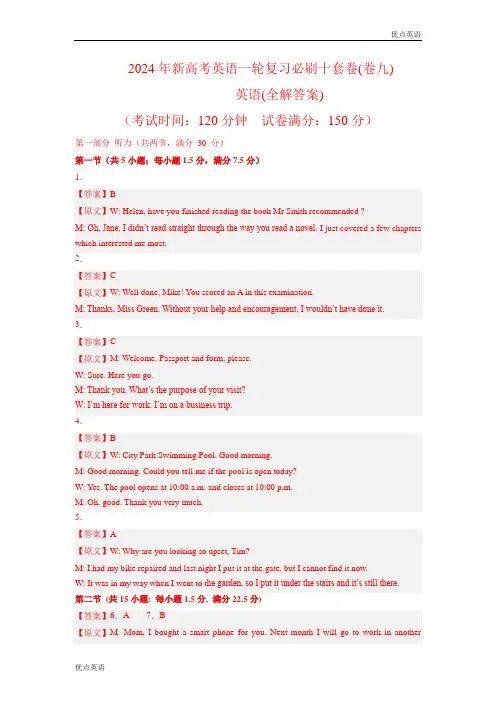
2024年新高考英语一轮复习必刷十套卷(卷九)英语(全解答案)(考试时间:120分钟试卷满分:150分)第一部分听力(共两节,满分30 分)第一节(共5小题;每小题1.5分,满分7.5分)1.【答案】B【原文】W: Helen, have you finished reading the book Mr Smith recommended ?M: Oh, Jane, I didn’t read straight through the way you read a novel. I just covered a few chapters which interested me most.2.【答案】C【原文】W: Well done, Mike! You scored an A in this examination.M: Thanks, Miss Green. Without your help and encouragement, I wouldn’t have done it.3.【答案】C【原文】M: Welcome. Passport and form, please.W: Sure. Here you go.M: Thank you. What’s the purpose of your visit?W: I’m here for work. I’m on a business trip.4.【答案】B【原文】W: City Park Swimming Pool. Good morning.M: Good morning. Could you tell me if the pool is open today?W: Yes. The pool opens at 10:00 a.m. and closes at 10:00 p.m.M: Oh, good. Thank you very much.5.【答案】A【原文】W: Why are you looking so upset, Tim?M: I had my bike repaired and last night I put it at the gate, but I cannot find it now.W: It was in my way when I went to t he garden, so I put it under the stairs and it’s still there.第二节(共15小题: 每小题1.5分, 满分22.5分)【答案】6.A 7.B【原文】M: Mom, I bought a smart phone for you. Next month I will go to work in anothercountry. You can still connect with me on the Internet.W: But I really don’t know how to use it. It’s hard for the old to learn new things.M: It’s OK. I’ll teach you how to have a video chat.W: All right. I will try my best to follow you. It will save a lot of money on phone bills anyway. 【答案】8.C 9.B【原文】W: Good morning. Can I help you?M: Good morning. I’d like to book a single room with a bath.W: I’m afraid the single room has been booked out. How about the double room with a bath?M: That’s OK. How much is the fee per night?W: $70. When will you be arriving and leaving, sir?M: From Monday, October 22nd to Friday, October 26th, for 4 nights.【答案】10.B 11.A 12.C【原文】W: Who are these people dressed in funny costumes?M: That picture was taken when we worked as circus performers in Moscow. On the right is my dad’s cousin Carl and next to him is Carl’s father who owned the circus.W: I can’t believe you were one of those people who do dangerous jumps like that. How long were you in the circus?M: I started when I was a kid about 12. We stayed with the circus for about 10 years. Shortly after we moved the show to Normandy, my older sister broke her leg. Then my parents decided maybe it was time for us to retire. My sister got hurt when she was about 23. I was a year younger at the time and didn’t want to leave.W: That’s too bad she got hurt. Do you still do performances?M: I consult these days. I actually have to travel to India next week to look at the safety equipment of a circus. It will be the first time returning there after my sister got hurt. She lives there managing a hotel.【答案】13.B 14.B 15.B 16.C【原文】W: Hello, everyone. Today, we’ve invited Herbert Wilde to participate in our program. He is a Swiss writer born in Italy, becoming one of Britain’s most popular playwrights. Herbert, can you talk about your burdens as a celebrity?M: Once a person becomes famous, he would pay for it by giving up the freedom to express himself with his own style. He is always living under too much attention without privacy. So I do need a normal and peaceful life.W: I can understand your feelings. Well, if you have a second chance to make a decision, what will you choose, fame or freedom?M: I’ll choose the latter. I want to be the person I want to be, instead of the person others want. And I want to draw my inspiration from the quiet countryside one day.W: I really appreciate your courage to follow your heart. I hope that you can live a happy life and write more good works. But I also hope you can try your best to balance your work and life.【答案】17.C 18.B 19.C 20.A【原文】W: I want a cheeseburger for lunch, and maybe some French fries and a milk shake. M: That’s way too much food, Lucy. I’m going to order something healthy with vegetables.W: Why are you now eating healthier, Russell? Are you trying to lose weight, or do you feel sick? M: I feel fine. I am actually thinking of participating in a race this autumn and I want to be as fit as possible.W: That’s a long time from now. Will changing what you eat actually affect your performance? My brother only eats fried food and he plays soccer all the time without a problem.M: What you eat can change a lot of things, but it also affects everyone differently. Your brother is five years younger than us, so he still can process food quickly. Now that we are older, I really feel different when I eat bad food.W: So because you feel better, you will be able to run much faster? Is it because you will be lighter from eating less?M: It’s more like because I feel better all the time, I am able to work out and tra in for longer. If I train harder, I will be able to get better results and become faster than before.W: Having the energy to do that is important, but I want to enjoy my meal more than anything else.第二部分阅读理解(共两节,满分50分)第一节(共15小题;每小题2.5分,满分37.5分)【答案】21.C 22.A 23.D【导语】本文是一篇应用文。
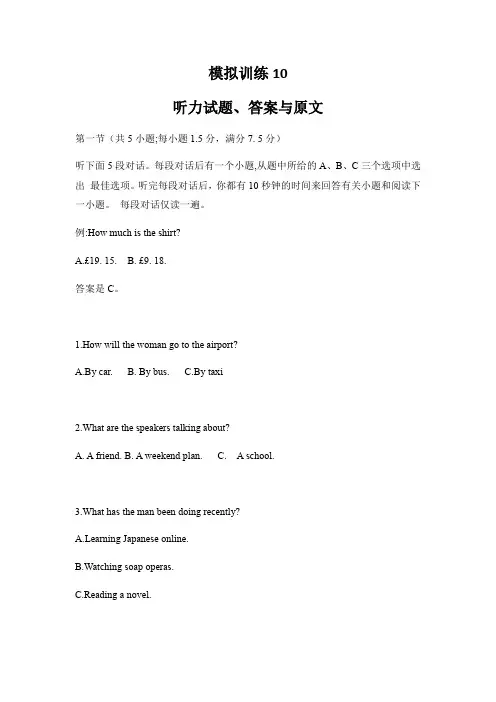
模拟训练10听力试题、答案与原文第一节(共5小题;每小题1.5分,满分7. 5分)听下面5段对话。
每段对话后有一个小题,从题中所给的A、B、C三个选项中选出最佳选项。
听完每段对话后,你都有10秒钟的时间来回答有关小题和阅读下一小题。
每段对话仅读一遍。
例:How much is the shirt?A.£19. 15.B. £9. 18.答案是C。
1.How will the woman go to the airport?A.By car.B. By bus.C.By taxi2.What are the speakers talking about?A. A friend.B. A weekend plan.C. A school.3.What has the man been doing recently?A.Learning Japanese online.B.Watching soap operas.C.Reading a novel.4.Where does this conversation take place?A.At the speakers" home.B.In the woman's office.C.In a restaurant.5.What does the man want to major in at college?A.Medicine.B. Psychology.C. Geography.第二节(共15小题;每小题1. 5分,满分22.5分)听下面5段对话或独白。
每段对话或独白后有几个小题,从题中所给的A、B、C 三个选项中选出最佳选项。
听每段对话或独白前,你将有时间阅读各个小题,每小题5秒钟;听完后,各小题将给出5秒钟的作答时间。
每段对话或独白读两遍。
听第6段材料,回答第6、7题。
6.Why does the man look upset?A.He feels sick.B.He suffers physical pain.C.He lost his favorite player.7.What does the woman think of the man's feeling?A.Understandable.B. Unacceptable.C. Unreasonable听第7段材料,回答第8至10题。
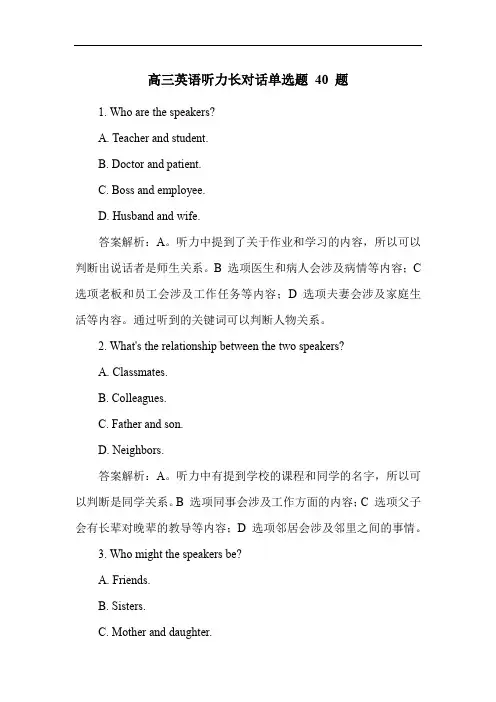
高三英语听力长对话单选题40 题1. Who are the speakers?A. Teacher and student.B. Doctor and patient.C. Boss and employee.D. Husband and wife.答案解析:A。
听力中提到了关于作业和学习的内容,所以可以判断出说话者是师生关系。
B 选项医生和病人会涉及病情等内容;C 选项老板和员工会涉及工作任务等内容;D 选项夫妻会涉及家庭生活等内容。
通过听到的关键词可以判断人物关系。
2. What's the relationship between the two speakers?A. Classmates.B. Colleagues.C. Father and son.D. Neighbors.答案解析:A。
听力中有提到学校的课程和同学的名字,所以可以判断是同学关系。
B 选项同事会涉及工作方面的内容;C 选项父子会有长辈对晚辈的教导等内容;D 选项邻居会涉及邻里之间的事情。
3. Who might the speakers be?A. Friends.B. Sisters.C. Mother and daughter.D. Shop assistant and customer.答案解析:A。
听力中两人在轻松地聊天,分享生活中的事情,没有长辈对晚辈的语气,也没有买卖的场景,所以是朋友关系。
B 选项姐妹会有更亲密的称呼等;C 选项母女会有不同的语气和话题;D 选项售货员和顾客会有关于商品的交流。
4. What is the relationship between them?A. Teacher and parent.B. Brothers.C. Coach and athlete.D. Cousins.答案解析:A。
听力中提到了孩子的学习情况和学校的事情,所以可以判断是老师和家长的关系。
B 选项兄弟会有更随意的交流;C 选项教练和运动员会涉及训练等内容;D 选项表亲关系会比较疏远。
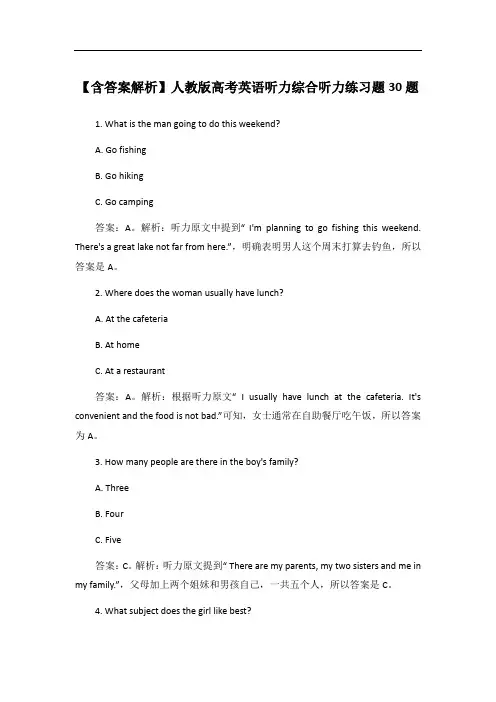
【含答案解析】人教版高考英语听力综合听力练习题30题1. What is the man going to do this weekend?A. Go fishingB. Go hikingC. Go camping答案:A。
解析:听力原文中提到“ I'm planning to go fishing this weekend. There's a great lake not far from here.”,明确表明男人这个周末打算去钓鱼,所以答案是A。
2. Where does the woman usually have lunch?A. At the cafeteriaB. At homeC. At a restaurant答案:A。
解析:根据听力原文“ I usually have lunch at the cafeteria. It's convenient and the food is not bad.”可知,女士通常在自助餐厅吃午饭,所以答案为A。
3. How many people are there in the boy's family?A. ThreeB. FourC. Five答案:C。
解析:听力原文提到“ There are my parents, my two sisters and me in my family.”,父母加上两个姐妹和男孩自己,一共五个人,所以答案是C。
4. What subject does the girl like best?A. EnglishB. MathC. History答案:C。
解析:原文中女孩说“Among all the subjects, I like history best. It's so interesting to learn about the past.”,表明女孩最喜欢历史,答案为C。
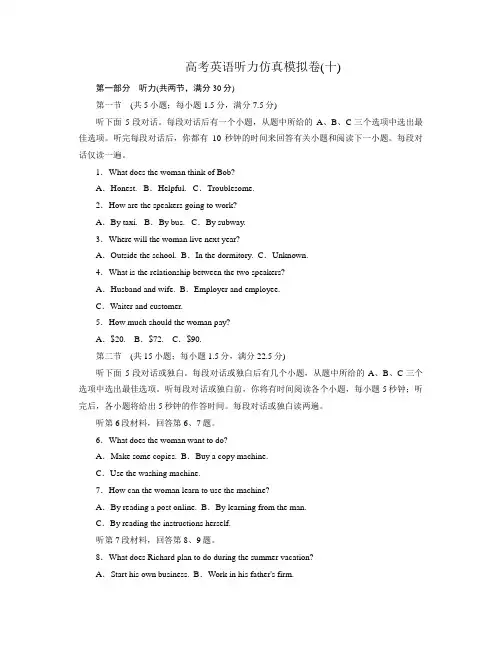
高考英语听力仿真模拟卷(十)第一部分听力(共两节,满分30分)第一节(共5小题;每小题1.5分,满分7.5分)听下面5段对话。
每段对话后有一个小题,从题中所给的A、B、C三个选项中选出最佳选项。
听完每段对话后,你都有10秒钟的时间来回答有关小题和阅读下一小题。
每段对话仅读一遍。
1.What does the woman think of Bob?A.Honest. B.Helpful. C.Troublesome.2.How are the speakers going to work?A.By taxi. B.By bus. C.By subway.3.Where will the woman live next year?A.Outside the school. B.In the dormitory. C.Unknown.4.What is the relationship between the two speakers?A.Husband and wife. B.Employer and employee.C.Waiter and customer.5.How much should the woman pay?A.$20. B.$72. C.$90.第二节(共15小题;每小题1.5分,满分22.5分)听下面5段对话或独白。
每段对话或独白后有几个小题,从题中所给的A、B、C三个选项中选出最佳选项。
听每段对话或独白前,你将有时间阅读各个小题,每小题5秒钟;听完后,各小题将给出5秒钟的作答时间。
每段对话或独白读两遍。
听第6段材料,回答第6、7题。
6.What does the woman want to do?A.Make some copies. B.Buy a copy machine.C.Use the washing machine.7.How can the woman learn to use the machine?A.By reading a post online. B.By learning from the man.C.By reading the instructions herself.听第7段材料,回答第8、9题。
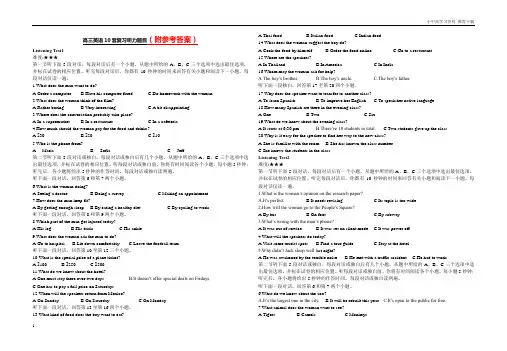
小中高学习资料推荐下载高三英语10套复习听力题目(附参考答案)Listening Test1难度:★★★第一节听下面5段对话。
每段对话后有一个小题,从题中所给的A、B、C三个选项中选出最佳选项,并标在试卷的相应位置。
听完每段对话后,你都有10秒钟的时间来回答有关小题和阅读下一小题。
每段对话仅读一遍。
1.What does the man want to do?A.Order a computer.B.Have his computer fixed.C.Do homework with the woman.2.What does the woman think of the film?A.Rather boring.B.Very interesting.C.A bit disappointing.3.Where does the conversation probably take place?A.In a supermarket.B.In a restaurant.C.In a cafeteria.4.How much should the woman pay for the food and drinks?A.$30.B.$20.C.$10.5.Who is the phone from?A. Maria.B. Sofia.C. Jeff.第二节听下面5段对话或独白。
每段对话或独白后有几个小题,从题中所给的A、B、C三个选项中选出最佳选项,并标在试卷的相应位置。
听每段对话或独白前,你将有时间阅读各个小题,每小题5秒钟;听完后,各小题将给出5秒钟的作答时间。
每段对话或独白读两遍。
听下面一段对话,回答第6和第7两个小题。
6.What is the woman doing?A.Seeing a doctorB.Doing a survey.C.Making an appointment.7.How does the man keep fit?A.By getting enough sleep.B.By eating a healthy diet.C.By cycling to work.听下面一段对话,回答第8和第9两个小题。
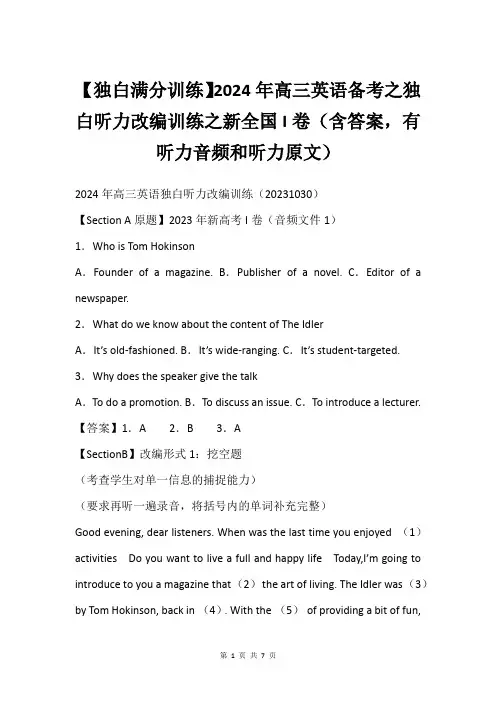
【独白满分训练】2024年高三英语备考之独白听力改编训练之新全国I卷(含答案,有听力音频和听力原文)2024年高三英语独白听力改编训练(20231030)【Section A原题】2023年新高考I卷(音频文件1)1.Who is Tom HokinsonA.Founder of a magazine. B.Publisher of a novel. C.Editor of a newspaper.2.What do we know about the content of The IdlerA.It’s old-fashioned. B.It’s wide-ranging. C.It’s student-targeted. 3.Why does the speaker give the talkA.To do a promotion. B.To discuss an issue. C.To introduce a lecturer.【答案】1.A 2.B 3.A【SectionB】改编形式1:挖空题(考查学生对单一信息的捕捉能力)(要求再听一遍录音,将括号内的单词补充完整)Good evening, dear listeners. When was the last time you enjoyed (1)activities Do you want to live a full and happy life Today,I’m going to introduce to you a magazine that (2)the art of living. The Idler was (3)by Tom Hokinson, back in (4). With the (5)of providing a bit of fun,freedom and achievement in the busy world, it is now published (6).In every issue, you will find an interesting mix of interviews and essays on the good life, history, (7), arts and fashion (8). You will find much to laugh at and much useful stuff as well, from (9)for making bacon to guides to (10).If you ever felt that there is more to life than boring jobs, then why not (11)to it The Idler is a cheering read that makes you feel better about life. You can download the (12)and subscribe today to get your first issue free.作答区域【答案】1. leisure2. features3. launched4. 19935. intention6. bimonthly7. philosophy8. photography9. recipes10. housekeeping11. subscribe12. application【Section C】精选句子翻译训练With the intention of providing a bit of fun, freedom and achievement in the busy world, it is now published bimonthly.You will find much to laugh at and much useful stuff as well, from recipes for making bacon to guides to housekeeping.The Idler is a cheering read that makes you feel better about life.【答案】1. 带着提供一些乐趣、自由和成就的意图,现在这本杂志已经改为双月刊出版。
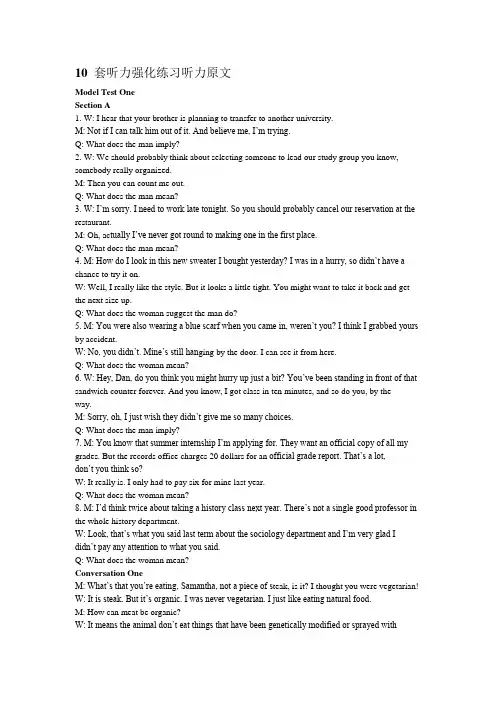
10 套听力强化练习听力原文Model Test OneSection A1. W: I hear that your brother is planning to transfer to another university.M: Not if I can talk him out of it. And believe me, I‟m trying.Q: What does the man imply?2. W: We should probably think about selecting someone to lead our study group you know, somebody really organized.M: Then you can count me out.Q: What does the man mean?3. W: I‟m sorry. I need to work late tonight. So you should probably cancel our reservation at the restaurant.M: Oh, ac tually I‟ve never got round to making one in the first place.Q: What does the man mean?4. M: How do I look in this new sweater I bought yesterday? I was in a hurry, so didn‟t have a chance to try it on.W: Well, I really like the style. But it looks a little tight. You might want to take it back and get the next size up.Q: What does the woman suggest the man do?5. M: You were also wearing a blue scarf when you came in, weren‟t you? I think I grabbed yours by accident.W: No, you didn‟t. Mine‟s still han ging by the door. I can see it from here.Q: What does the woman mean?6. W: Hey, Dan, do you think you might hurry up just a bit? You‟ve been standing in front of that sandwich counter forever. And you know, I got class in ten minutes, and so do you, by the way.M: Sorry, oh, I just wish they didn‟t give me so many choices.Q: What does the man imply?7. M: You know that summer internship I‟m applying for. They want an official copy of all my grades. But the records office charges 20 dollars for an official grade report. That‟s a lot,don‟t you think so?W: It really is. I only had to pay six for mine last year.Q: What does the woman mean?8. M: I‟d think twice about taking a history class next year. There‟s not a single good professor in the whole history department.W: Look, that‟s what you said last term about the sociology department and I‟m very glad Ididn‟t pay any attention to what you said.Q: What does the woman mean?Conversation OneM: What‟s that you‟re eating, Samantha, not a piece of s teak, is it? I thought you were vegetarian! W: It is steak. But it‟s organic. I was never vegetarian. I just like eating natural food.M: How can meat be organic?W: It means the animal don‟t eat things that have been genetically modified or sprayed withpesticides.M: And I suppose it has had a good time walking around the fields, not shut inside all its life. W: That‟s right.M: But can you taste the difference?W: I think so. Anyway, I‟m not filling myself with all sorts of chemicals that might give me cancer.M: Yes, but there‟s no proof that pesticides give you cancer.W: So why do the scientists who monitor these things prefer to eat organic food too? Pesticides are only tested on animals. Companies don‟t have to spend millions on trials with human volunteers. Small quantities of chemicals do get into your food.M: Some food. Look, if the newspapers found a company was deliberately selling an unsafe product, their share price would crash and they‟d be out of business in no time.W: They may go out of bu siness soon if they don‟t start selling organic food themselves. They say sales of organic food have risen by 25%.M: It‟s still more expensive. You‟ve got to compare the price, which is at least double, with the risk you‟re running, which is absolutely minimal if you ask me.W: Well, this is prime organic beef from the Scottish Highlands. So if you don‟t mind, I‟d like to finish my lunch!9. Q: What can we learn about the woman‟s eating habit?10. Q: What is said about organic animals?11. Q: How do companies test pesticides?12. Q: What is the man‟s opinion on organic food‟s price?Conversation TwoW: Professor Bevan, how important is motivation for a manager?M: Oh, motivation is extremely important. I‟d say it‟s the most important aspect of a manager‟s job. A manager‟s job is to get the job done. So he has to motivate the workers—as a team and also on an individual basis.W: So how do managers go about doing this? It doesn‟t sound very easy.M: No, it is a complicated issue. But managers have special tools. They are trained to use them to boost motivation and increase production to a maximum.W: Tools?M: Yes, such as praise, approval, recognition, trust and expectation.W: And money? What about money?M: Yes, money is a factor but you might be surprised to learn that it comes out last on the list of these tools.W: What are more important for workers?M: Well, all of the things that I have already mentioned, and then job enrichment and good communication.W: And have you got any examples of real life situations to back up your claims?M: One good example is the firm Western Electric. When managers started to talk to the workers and encouraged them to get involved in decision making, workers began to feel that their contributions were important. And it paid off.W: Productivity increased?M: Yes, hugely.W: So, let‟s get this straight. Are you saying that workers are not interested in earning more money?M: I‟m saying they‟re not just interested in money. There are other things that are just as important.13. Q: What is extremely important for a manager to do?14. Q: What does the man think of money?15. Q: In what way did motivation work in the example of Western Electric?Section BPassage OneHave you ever heard of tobacco toothpaste? That‟s just one o f many tobacco products that are popular in India, the world‟s second most populous nation. Cigarettes are the most widely used form of tobacco, of course, but Indians also are fond of a wide selection of smokeless, chewable varieties—despite the fact that India has the world‟s highest rate of tobacco-related diseases such as cancer and emphysema. Because many children and adolescents chew tobacco from morning till night, the incidence of mouth cancer has skyrocketed.Leading a campaign to warn India‟s yout h of the dangers of tobacco is Ruby Bhatia, whogives many speeches and television interviews. Bhatia was born in Alabama, grew up in Canada, and majored in philosophy at the University of Toronto. She moved to India a few years ago, already fluent in Hind i and English (two of India‟s major languages), and quickly became one of India‟s most popular TV talk-show hosts.Bhatia says that her TV experience helps her create anti-tobacco speeches that are short and persuasive. “If you give a lot of ideas that are only loosely tied together, you won‟t win your case. Your ideas must have a logical sequence.” TV reports—which she says are a good model for public speakers to follow—often use a chronological, story-telling pattern or a problem-solution pattern.16. Q: What‟s the result of many Indian children‟s chewing tobacco from morning till night?17. Q: What contributed to Ruby Bhatia‟s becoming one of India‟s most popular TV talk-show hosts?18. Q: What suggestions did Bhatia give in creating speeches?Passage TwoFor many years now we have been referring to English as a global language. Everybodyseems to be learning English and it isn‟t uncommon to see English being used as a means of communication between, let‟s say, a German and an Italian. Very soon English wi ll be the second language of all the people in the world.We can see evidence of changes in this all the time. Let‟s take the Eurovision Song Contest asan example. Whatever we might think of the contest itself, one thing that has changed recently is that now countries can opt to sing in English. In the last festival fourteen of the twenty five competing countries asked for the rules to be changed to allow them to sing in English. They argued that singing in their own language would put them at a disadvantage.And what exactly does all of this mean for native speakers of English? Well, we are alreadyin a minority. In the future, majority speakers—that are non-native English speakers—might outnumber native English speakers by four to one. The two most import ant Englishes won‟t be British English and American English. They‟ll be Native English and Majority English. So native English speakers will be the only people in the world who speak just one language. Because therewon‟t be much of a reason for native Eng lish speakers to learn a second language. As more and more people speak English, it makes sense that they will become more competent. It‟s us, not the Majority English speakers, will be the disadvantaged.19. Q: What kind of people are often seen communicating in English as mentioned by the speaker?20. Q: Why did many competing countries ask to be allowed to sing in English in the contest?21. Q: What is the speaker concerned about the most?Passage ThreeAt the beginning of a speech, student speaker Kathi e Aquila posed a question: “On what formof entertainment do Americans spend the greatest amount of money? I‟ll give you some hints. It‟s not recorded music, nor sports events, nor rock concerts, nor theme parks.”Then she revealed the answer: legalized gambling, on which Americans each year spend$340 billion—more money than they spend on all other forms of entertainment combined. In the body of the speech, Aquila tried to persuade her audience that gambling is a waste of money and time. Then she closed the speech with a quotation by Mark Twain: “…There are two times in your life when you should not gamble: when you can‟t afford it and when you can.‟”Aquila‟s speech was lively and impressive, partly because she used an interestingintroduction and a memorable conclusion.Some speakers make no plans for the beginning and end of a speech, preferring to wait until speech time to let the mood of the moment determine what they say. This strategy is a mistake. If you don‟t have a lively introduction, you can lose your audience. “People have remote controls in their heads today,” says Myrna Marofsky, a business executive. “If you don‟t catch their interest, they just click you off.” And a conclusion that is weak or clumsy can damage the effectiveness of what otherwise might have been a good speech.Since the introduction and conclusion are extremely important, devote as much time and energy to them as you give to the body of the speech.22. Q: What did Aquila do at the beginning of her speech?23. Q: How did Aquila conclude her speech?24. Q: What mistake do some speakers make when they prepare a speech?25. Q: What does the speaker suggest speechmakers do at the end of the passage?Model Test TwoSection A1. M: I‟ve been running a mile every afternoon for the past month. But I still haven‟t been able to lose more than a pound or two. I wonder if this is worth it.W: Oh, don‟t give up now. It always seems hard when you just start out.Q: What does the woman mean?2. W: I just found out the registration of the creative writing class was full. Now I have to wait another whole year to get in.M: Why don‟t you check back after the first week? Somebody might drop it.Q: What does the man suggest the woman do?3. W: John, I really can‟t afford any more interruptions right now. I‟ve got to finish this assignment.M: I‟m sorry Cathy. Just one more thing, I forgot to ask you if you could give me a ride to school tomorrow.Q: What can be inferred about the man?4. M: Excuse me? Could you direct me to Customer Service? I need to have this gift wrapped. W: We can take care of that right here sir, and no charge. You can choose either silver or gold with the matching bow.Q: What will the man probably do next?5. W: Oh, no! I just picked up the pictures I took at Dan and Linda‟s we dding and looked at them and none of them came out.M: They are dark, aren‟t they? What a shame. Oh, well, I‟m sure the professional photographer got everything.Q: What does the man mean?6. M: I have to give an oral presentation in history next week. I‟m really nervous about speaking in front of everyone.W: Try making a tape of yourself while you practise. That might help you feel more comfortable.Q: What does the woman suggest the man do?7. W: I‟m amazed that you are still driving that old car of your s. I thought you would have gotten rid of it years ago.M: It runs well and I‟ve actually grown quite attached to it.Q: What does the man mean?8. M: I was going to get something to eat at the cafeteria, but it seems to be closed.W: Oh, that‟s because it‟s Sunday. Why don‟t you come with me to a place I know on Canal Street?Q: What does the woman suggest they do?Conversation OneM: Hi, Sis. I just came over to drop off the DVDs you wanted. Wow!? Where did you get all of this stuff?W: I bought it. So, what do you think of my new entertainment center? The widescreen TV and new DVD player.M: But where did you get the money to buy all this? You didn‟t borrow money from mom and dad again, did you?W: Of course not. I got it with this! It‟s a student credit card.M: A student credit card? How did you get one?W: I got an application in the mail.M: Well, why did you get one in the first place?W: Listen. Times are changing, and having a credit card helps you build a credit rating, control spending, and even buy things that you can‟t pay with cash. Like the plane ticket I got recently.M: What plane ticket?W: Oh yeah, my roommate and I are going to Hawaii over the school break, and of course I need some clothes.M: I don‟t want to hear it. How does having a s tudent credit card control spending? And the interest rates of student credit cards are usually sky-high, and if you miss a payment, the rates, well, just jump!W: Ah. The credit card has a credit limit.M: Yeah. Oh, don‟t tell me. Listen. Hey, I don‟t thi nk having a student credit card is a bad idea, but this is ridiculous. And how are you going to pay off your credit card bill?W: Um, with my birthday money. It‟s coming up in a week.M: Hey, let‟s sit down and talk about how you‟re going to pay things bac k, and maybe we can come up with a budget that will help you get out of this mess. That‟s the least I can do.9. Q: According to the woman, which items were purchased with credit card?10. Q: Why did the woman get a student credit card?11. Q: What does the woman plan to do with her credit card problems?12. Q: What is the man going to do to help the woman out?Conversation TwoM: Honey, the basketball game is about to start. And could you bring some chips and a bowl of icecream? And a slice of pizza from the fridge.W: Anything else?M: No, that‟s all for now. Hey, you know, they‟re organizing a company basketball team, and I‟m thinking about joining. What do you think?W: Humph.M: Humph? What do you mean “Humph”? I was the star player in high school.W: Yeah, twenty-five years ago. Look,I just don‟t want you to have a heart attack running up and down the court.M: So, what are you suggesting? Should I just abandon the idea? I‟m not that out of shape.W: Well, you ought to at least have a physical plan before you begin. I mean, it has been at least five years since you played at all.M: Well, okay.W: And you need to watch your diet and cut back on the fatty foods, like ice cream. And you should try eating more fresh fruits and vegetables.M: Yeah, you‟re probably right.W: And you should take up a little weight training to strengthen your muscles or perhaps try cycling to build up your heart function. Oh, and you need to go to bed early instead of watching TV half the night.M: Hey, you‟re starting to sou nd like my personal fitness instructor!W: No, I just want you to be around for a long, long time.13. Q: What does the man want to do?14. Q: What is the woman‟s main concern?15. Q: What does the woman advise about the man‟s diet?Section BPassage OneYou have probably noticed that many speakers at business and professional meetings start offby saying something like this: “I‟m glad to have a chance to speak to you today.” They are giving an icebreaker—a polite little prologue to “break the ice” before getting into their speech.When you give speeches in the community, an icebreaker is helpful because it eases your nervous tension and it lets the audience get accustomed to your voice. You don‟t need an icebreaker for classroom speeches because your audience has already settled down and is ready to listen.I don‟t like “Hello, how are you?” as an icebreaker. It leaves a question as to whether the speaker wants the audience to roar a response like “Fine, thank you!” It is much better to say, “I appreciate t he opportunity to speak to you tonight.” But, you might object, phrases like this have been used so often, they are meaningless. Nevertheless, they are valuable aids to smooth social relationships. Such expressions are dull but they are necessary because they lubricate the wheels of human discourse.In addition to expressing appreciation for the invitation to speak, you can include a thank-youto the person who introduced you or a reference to the occasion. Some speakers also use the icebreaker to formally greet the audience. This custom, however, has fallen out of fashion.An icebreaker should be very brief—just a sentence or two. If you are too slow getting intothe attention material of your introduction, you may cause some listeners to tune you out.16. Q: Why is an icebreaker helpful according to the speaker?17. Q: Why doesn‟t the speaker like “Hello, how are you?” as an icebreaker?18. Q: What warning does the speaker give at the end of the passage?Passage TwoHonesty may well be the policy, but it often deserts us when no one is watching,psychologists report today. Experiments with an honesty box to collect payments for hot drinks show that people are better at paying up when under the gaze of a pair of eyes. The surprise was that the eyes were not real, but photographed.Researchers at Newcastle University set up the experiment in secret. They attached a posterto a cupboard of mugs above an honesty box alongside a kettle, with tea, coffee and milk. Over 10 weeks, they alternated each week between images of eyes and pictures of flowers.Dr. Bateson, a biologist and leader of the study, said that even though the eyes were not realthey still seemed to make people behave more honestly. The effect may arise from behavioral characteristics that developed as early humans formed social groups that increased their chances of survival. Individuals had to co-operate for the good of the group, rather than act selfishly.“If nobody is watching us, it is in our interests to behave selfishly. But when we think we‟re being watched we should behave better, so people see us as co-operative and behave the same way towards us, ” Dr. Bateson said.“We thought we‟d get a slight effect with eyes, but it was quite striking how much differencethey made. Even at a subconscious level, it seems people respond to eyes, and that might be because eyes send a strong biological signal we have evolved to respond to.”19. Q: What is this passage mainly about?20. Q: Why do people behave honestly under the watch of eyes?21. Q: Before the experiment, what did the researchers expect about the result?Passage ThreeBefore children go into a hospital for surgery, their parents need to know how to preparethem emotionally and intellectually. What should they tell the children about pain and recovery? How can they ease fears and provide comfort?To help parents with this task, the pediatrics department at a large metropolitan hospital asked Jessica Trujillo, a student nurse, to prepare a presentation and deliver it once a week to parents. Tru jillo knew some information from her experiences working with children in the “peds”ward, but she realized that her presentation would be much stronger if she researched the topic. She interviewed children who had undergone surgery, and she talked with parents and healthprofessionals. She read books and journal articles, and she explored the Internet.“I came up with some insights that I never would have discovered without doing research,”she said. Her most surprising find: Many children think they are being sent to the hospital as punishment for bad behavior. “This just blew my mind. I wouldn‟t have guessed this in a hundred years. So, of course, in my presentation I emphasize to parents that they should reassure their kids that they‟ve done nothing wrong and aren‟t being punished.”Trujillo‟s experience illustrates the value of research in speechmaking. Even if you alreadyknow a lot about a topic, research can yield valuable information and insights.22. Q: What do parents need to do before sending their children to a hospital for surgery?23. Q: What did Trujillo do to make her presentation stronger?24. Q: What is the most surprising find in Trujillo‟s research?25. Q: What do we learn from Trujillo‟s experience?Model Test ThreeSection A1. M: I‟m t rying to find someone to come with me to the spring fashion show in the art museum on Saturday. Want to come along?W: Well, I‟m not too crazy about fashion, but what about Lora? She‟s taking a fashion design course and seems to be enjoying it.Q: What does the woman suggest the man do?2. W: I walk past the coffee house every day, and I always see Leo there, either playing a game or reading the paper.M: Well, Leo knows more ways to kill time than anyone.Q: What does the man say about Leo?3. M: Can you b elieve I can‟t get a plane ticket for the Christmas holidays? I mean, it‟s only November.W: Well, I wouldn‟t worry about it too much. You know, people cancel their reservations all the time.Q: What does the woman imply the man should do?4. W: It‟s a lon g time since you left the company. Where are you working now?M: In a fast food restaurant. It‟s a real pain. But I can‟t complain. Many people are out of work these days.Q: What do we learn about the man?5. M: Look, the trees on our campus are really beautiful.W: Yeah, and they are useful too. They cut down on our needs for air conditioning, don‟t you think so?Q: What does the woman mean?6. M: Jenny, would you like to go to the concert with me this weekend, or do you have to prepare for your finals?W: In fact, I still have a lot to do for the exams, but maybe a break would do me good.Q: What will the woman probably do?7. W: What do you think of my new hat, honey? It‟s bright, but awfully simple, don‟t you think so?M: Well, if you really want my opinion, I should not say awfully simple, but simply awful!Q: How does the man feel about the woman‟s hat?8. M: Has Larry finished his term paper for chemistry? It will be due the day after tomorrow, and Professor Johnson has never been happy with late papers.W: As far as I know, he seems to put everything off until the last minute.Q: What do we learn about Larry from the conversation?Conversation OneM: You like living in the city, don‟t you?W: Oh, I love it. It‟s so convenient. I can take the bus to work, or the subway, or the taxi. And there‟s so much to do.M: I know what you mean. I‟d like to live in the city, too, but living in the suburbs is better for children.W: Well, there are a lot of good things about suburban living. But, as a working woman, I think a city has all the conveniences, including the best food and latest news.M: But there are more trees, grass and fresh air in the suburbs.W: You can take them to the suburbs on the weekends. Living in a city, you‟ll have so much fun. Movie houses, theatres, museums and so many great places.M: Yeah, children are the right age. There are lots of things for them here.W: You‟re right. Today is the perfect example. They are at the aquarium in Brooklyn now. They come back home for lunch, and the n go uptown to the Museum of Natural History. There‟s so much for young people to see and do. It‟s just incredible!M: Not just for young people. What about me? I‟ve never been to the aquarium or the Museum of Natural History.W: Neither have I. When I was a child, I used to go to the Museum of Arts.M: I‟ve been there several times. Twice with children.W: Well, I have an idea. Next weekend, we go to the Museum of Natural History.M: OK, that‟s really a very good idea.9. Q: What are the two speakers mainly talking about?10. Q: What does the man think of living in the suburbs?11. Q: What is the man‟s opinion of the city?12. Q: What do we learn about the woman from the conversation?Conversation TwoM: Right, I guess you‟ve got some ideas for our product promotion.W: Well, first we must win over the medical circle, so I thought we should launch a campaign in all the specialist medical journals to promote our drugs, antibiotics and so on.M: That‟s a very good idea.W: Then TV commercials.M: Just a moment, are you sure we‟re allowed to advertise medicines on TV?W: Oh yes, provided they are not drugs which need a prescription. You can advertiseover-the-counter products. We can get users of our products to recommend them, like “It cured my disease in six d ays.”M: Now, hold on. It is forbidden to claim any positive cure for a disease. And we mustn‟t offer any drugs for illness which should be treated by a doctor.W: OK. What about this? A series of full page newspaper ads with the message that most doctors consider our products the best.M: That depends on whether it‟s true.W: Sure it is. But here is another suggestion. We could offer to return the purchase price to anyone who‟s not satisfied with one of our products. It‟s possible to do that, isn‟t it?M: No, I‟m afraid not. Manufacturers of medical products are not allowed to promise a return for a price in their ads.W: Well, it looks as though I‟ll have to come up with something else. I never realize the regulations were so rigid.13. Q: What are the two speakers talking about?14. Q: Which suggestion of the woman‟s is possible according to the man?15. Q: What can we learn about the woman from the conversation?Section BPassage OneThroughout history, people have been the victims of pickpockets. Today pickpocketing is oneof the most rapidly increasing crimes. Pickpockets are increasing in number and developing better methods to practice their skill. About one million Americans lose money to pickpockets every year,and no one is really safe from a skilled pickpocket. His victims can be rich or poor, young or old. During the 18th century, pickpockets were hanged in England. Large crowds of people would gather to watch the hanging, which was supposed to be a warning to other pickpockets. However, in time the practice was discontinued. The reason: while people were attentively watching the hanging of a pickpocket, other pickpockets skillfully stole the money of the spectators.Police officials say that most efficient pickpockets come from South America. Many of themare trained in special schools called “Jingle Bell School”. A pickpocket graduates from a J.B.S. when he is able to steal a wallet from a dressed model that has bells inside its pockets!Even the most well-dressed, respectable person may be a pickpocket. Some of the favorite places of pickpockets are banks, airports, supermarkets and train and bus stations. Another kind of pickpocket works outside or inside bars and specializes in stealing from persons who have had too much alcohol. To avoid being the victim of pickpockets, it is important to be very cautious and alert in the midst of large gatherings of people.16. Q: What is the characteristic of the pickpockets today?17. Q: Why did the hanging of pickpockets come to an end?18. Q: Where do most expert pickpockets come from?19. Q: How to avoid being the victims of pickpockets?Passage TwoIn the north of Scotland, there is a deep, dark lake surrounded by mountains. This is Loch Ness—loch is the Scottish word for “lake”. A big and mysterious creat ure was said to live there. Although no one ever got a good look at it, local people believed in this creature. They thought it must be some kind of fish, since it lived in the lake.Before the 1930s, few outsiders had heard of the beast. Then a road was built along Loch Ness. Many visitors began seeing the loch and hearing about the beast. Some believed they had caught sight of it. Many papers printed stories about the monster.These stories made the monster famous. But many readers thought it was a joke. To them, a monster was a make-believe animal, something they might see in a movie.Accounts of the Loch Ness monster also sounded like jokes. Many people thought they hadseen part of it. The parts added up to a very strange creature indeed. It was said to be 20 or 30 or。
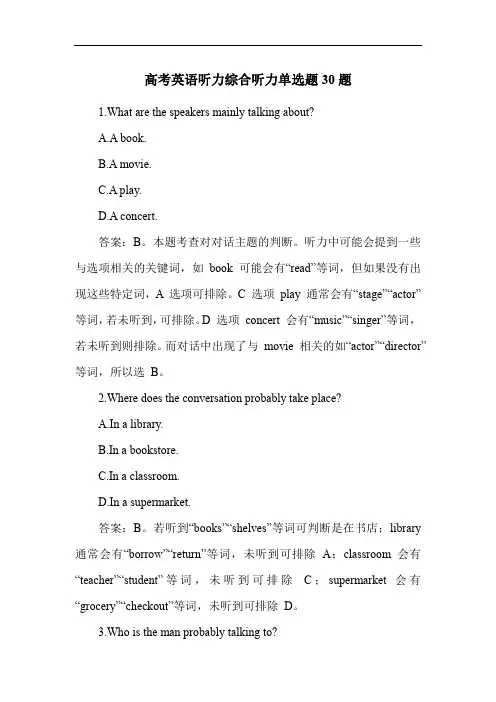
高考英语听力综合听力单选题30题1.What are the speakers mainly talking about?A.A book.B.A movie.C.A play.D.A concert.答案:B。
本题考查对对话主题的判断。
听力中可能会提到一些与选项相关的关键词,如book 可能会有“read”等词,但如果没有出现这些特定词,A 选项可排除。
C 选项play 通常会有“stage”“actor”等词,若未听到,可排除。
D 选项concert 会有“music”“singer”等词,若未听到则排除。
而对话中出现了与movie 相关的如“actor”“director”等词,所以选B。
2.Where does the conversation probably take place?A.In a library.B.In a bookstore.C.In a classroom.D.In a supermarket.答案:B。
若听到“books”“shelves”等词可判断是在书店;library 通常会有“borrow”“return”等词,未听到可排除A;classroom 会有“teacher”“student”等词,未听到可排除C;supermarket 会有“grocery”“checkout”等词,未听到可排除D。
3.Who is the man probably talking to?A.A doctor.B.A teacher.C.A policeman.D.A waiter.答案:A。
若听到“symptom”“illness”等词可判断是在和医生交谈;teacher 会有“class”“homework”等词,未听到可排除B;policeman 会有“crime”“accident”等词,未听到可排除C;waiter 会有“menu”“order”等词,未听到可排除D。
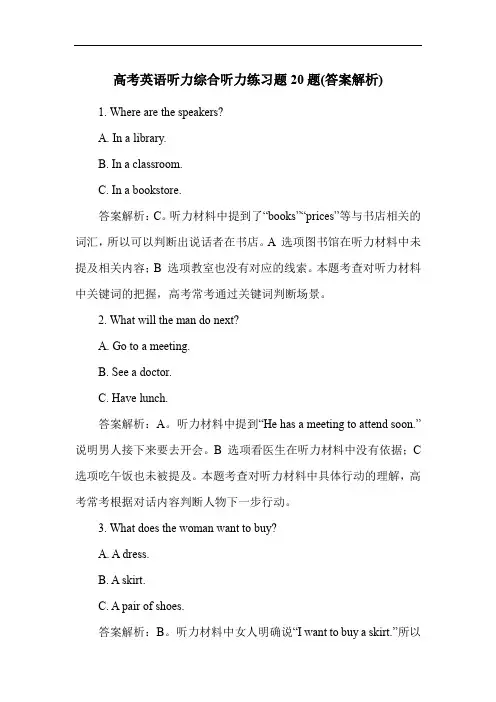
高考英语听力综合听力练习题20题(答案解析)1. Where are the speakers?A. In a library.B. In a classroom.C. In a bookstore.答案解析:C。
听力材料中提到了“books”“prices”等与书店相关的词汇,所以可以判断出说话者在书店。
A 选项图书馆在听力材料中未提及相关内容;B 选项教室也没有对应的线索。
本题考查对听力材料中关键词的把握,高考常考通过关键词判断场景。
2. What will the man do next?A. Go to a meeting.B. See a doctor.C. Have lunch.答案解析:A。
听力材料中提到“He has a meeting to attend soon.”说明男人接下来要去开会。
B 选项看医生在听力材料中没有依据;C 选项吃午饭也未被提及。
本题考查对听力材料中具体行动的理解,高考常考根据对话内容判断人物下一步行动。
3. What does the woman want to buy?A. A dress.B. A skirt.C. A pair of shoes.答案解析:B。
听力材料中女人明确说“I want to buy a skirt.”所以答案是B。
A 选项连衣裙和C 选项鞋子在听力材料中未被提到。
本题考查对听力材料中具体物品的捕捉,高考常考根据对话确定所需物品。
4. Who is the woman talking to?A. Her teacher.B. Her classmate.C. Her friend.答案解析:A。
听力材料中有“teacher”“assignment”等词汇,可以判断女人在和老师说话。
B 选项同学和C 选项朋友在听力材料中没有相关线索。
本题考查通过关键词判断对话对象,高考常考对人物关系的判断。
5. What time is it now?A. 8:30.B. 9:00.C. 9:30.答案解析:B。
高考英语听力模拟试第一节听下面5段对话,每段对话后有一个小题,从题中所给的A、B、C三个选项中选出最佳选项,并标在试卷的相应位置。
听完每段对话后,你都有10秒钟的时间来回答有关小题和阅读下一小题。
每段对话仅读一遍。
1. What time does the woman usually have breakfast?A. At 8:00.B. At 10:00.C. At 7:00.2. Where does this conversation take place?A. At a restaurant.B. At a bank.C. At a shop.3. What is the relationship between the two speakers?A. Shop assistant and customer.B. Shop assistant and her manager.C. Shop assistant and her father.4. What did the girl do last Sunday?A. She was iii at that time.B. She left her mother alone.C. She stayed with her mother at home.5. What did the woman buy her brother for Christmas?A. She bought him a watch.B. She has not bought him a present yet.C. She bought him a case for his coin collection.第二节听下面5段对话或独白。
每段对话或独白后有几个小题,从题中所给的A、B、C三个选项中选出最佳选项,并标在试卷的相应位置。
听每段对话前,你将有时间阅读各个小题,每小题5秒钟;听完后,各小题将给出5秒钟的作答时间。
高考英语听力综合听力单选题30题答案解析版1. Where does the conversation probably take place?A. In a library.B. In a bookstore.C. In a classroom.答案:B。
听力材料中提到了“books”“shelf”等与书店相关的词汇,所以可以判断对话发生在书店。
A 选项图书馆在听力材料中未提及相关信息。
C 选项教室也没有对应的内容。
2. What will the man do next?A. Go to a meeting.B. See a doctor.C. Have lunch.答案:A。
听力材料中男子说“I have a meeting to attend soon.”表明他接下来要去参加会议。
B 选项看医生在听力材料中未出现相关内容。
C 选项吃午饭也没有对应信息。
3. What does the woman mean?A. She doesn't like the movie.B. She has seen the movie before.C. She wants to watch the movie.答案:C。
听力材料中女人说“That movie sounds interesting. I'd like to see it.”表示她想观看这部电影。
A 选项她不喜欢电影与听力内容不符。
B 选项她以前看过电影在听力材料中未提及。
4. How does the man feel about the test?A. Confident.B. Nervous.C. Worried.答案:A。
听力材料中男子说“I'm well prepared for the test. I'm sure I can do well.”说明他对考试很有信心。
B 选项紧张和C 选项担心在听力材料中没有体现。
天学网英语高考听力第十辑答案1、My father always gets up early. He’s never late _______ work. [单选题] *A. toB. for(正确答案)C. onD. at2、11.________ big furniture shop it is! [单选题] *A.HowB.WhatC.What a (正确答案)D.What an3、74.In England people drive________. [单选题] *A.on the left(正确答案)B.in the leftC.on leftD.in left4、Chinese people spend _____ money on travelling today as they did ten years ago. [单选题] *A. more than twiceB. as twice muchC. twice as much(正确答案)D. twice more than5、It’s usually windy in spring, ______ you can see lots of people flying kites.()[单选题] *A. so(正确答案)B. orC. butD. for6、Nick got out of bed and _______ a shower. [单选题] *A. practicedB. took(正确答案)C. didD. made7、I don’t know how to improve my English. Can I ask you for some _______? [单选题] *A. answersB. advice(正确答案)C. questionsD. words8、--Don’t _______ too late, or you will feel tired in class.--I won’t, Mum. [单选题] *A. call upB. wake upC. stay up(正确答案)D. get up9、—______ is it from your home to the bookstore?—About 15 kilometers.()[单选题] *A. How far(正确答案)B. How muchC. How longD. How many10、____ is standing at the corner of the street. [单选题] *A. A policeB. The policeC. PoliceD. A policeman(正确答案)11、He kept walking up and down, which was a sure()that he was very worried. [单选题] *A. sign(正确答案)B. characterC. natureD. end12、—Where ______ you ______ for your last winter holiday?—Paris. We had a great time. ()[单选题] *A. did; go(正确答案)B. do; goC. are; goingD. can; go13、Researchers have spent five years collecting data()the study is based. [单选题] *A. on thatB. in whichC. in thatD. on which(正确答案)14、Becky is having a great time ______ her aunt in Shanghai. ()[单选题] *A. to visitB. visitedC. visitsD. visiting(正确答案)15、You _____ smoke in the library, or you will be driven away. [单选题] *A. can'tB. mustn't(正确答案)C. will notD. may not16、--What’s your _______, Jim Green?--Jim. [单选题] *A. full nameB. first name(正确答案)C. last nameD. family name17、80.Thousands of ________ from other countries visit the village every year. [单选题] * A.robotsB.postcardsC.tourists(正确答案)D.bridges18、My dog is very _______. It is safe to touch it if you want to. [单选题] *A. luckyB. deliciousC. friendly(正确答案)D. helpful19、Chinese is one of ____ most widely used languages in ____ world. [单选题] *A. a, theB. /, theC. the, the(正确答案)D. a, /20、The Spring Festival is on the way.Many shops have _______ huge posters with the word sales. [单选题] *A. put up(正确答案)B. put onC. put outD. put off21、I have worked all day. I'm so tired that I need _____ . [单选题] *A. a night restB. rest of nightC. a night's rest(正确答案)D. a rest of night22、--What would you like to say to your _______ before leaving school?--I’d like to say"Thank you very much!" [单选题] *A. workersB. nursesC. waitersD. teachers(正确答案)23、Patrick bought her two handbags as gifts,but _____ of them was her style. [单选题] *A. eitherB. noneC. neither(正确答案)D. all24、The Titanic is a nice film. I _______ it twice. [单选题] *A. sawB. seeC. have seen(正确答案)D. have saw25、When you are tired, listen to music and try to _______ yourself. [单选题] *A. supportB. showC. playD. relax(正确答案)26、The bookshop is far away. You’d better _______. [单选题] *A. by the busB. by busC. take busD. take?the bus(正确答案)27、We are living in an age()many things are done by computer. [单选题] *A. thatB. whichC. whyD. when(正确答案)28、--What are you going to be in the future?--I want to be _______ actor. [单选题] *A. aB. an(正确答案)C. theD. /29、You could hardly imagine _______ amazing the Great Wall was. [单选题] *A. how(正确答案)B. whatC. whyD. where30、Actually, we don't know whether this news comes from a reliable()or not. [单选题] *A. source(正确答案)B. originC. basisD. base。
高中英语听力在线训练[高中英语听力训练第十套]高中英语听力训练第十套高中英语听力训练第十套为了提高大家的英语听力水平,小编今天给大家整理了一套英语听力的练习题,大家有时间可以练一练。
第一节听下面5段对话。
每段对话后有一道小题,从题中所给的A、B、C三个选项中选出最佳选项标在试卷的相应位置。
听完每段对话后,你将有10秒钟的时间来回答有关小题和阅读下一小题。
每段对话你将听一遍。
1. Where does the conversation take place A. In an office. B. On the phone. C. In a company.2. Where does the conversation probably take place A. At a bank. B. At a shop. C. At a hotel.3. Where is the man from A. England. B. The US. C. Canada.4. Where is the man going A. Lake Drive. B. The Lake. C. The baker’s.5. Where are the two speakers most probably A. At home. B. At the airport. C. On the plane 第二节听下面5段对话或独白。
每段对话或独白后有几道小题,从每题所给的A、B、C三个选项中选出最佳选项标在试卷的相应位置。
听每段对话或独白前,你将有5秒钟时间阅读每小题,听完后,每小题将给出5秒钟的作答时间。
每段对话或独白你将听两遍。
听下面一段对话,回答第6、7题。
6. Where are the two speakers A. At the store. B. At home. C. At school.7. Wher e’s the mess A. In the b athroom. B. In the living room. C. In the kitchen. 听下面一段对话,回答第8至第10小题。
高三英语听力长对话单选题40题1. What is the relationship between the speakers?A. Teacher and student.B. Doctor and patient.C. Husband and wife.D. Shop assistant and customer.答案:D。
选项A,对话中没有提及任何与教学相关的内容。
选项B,对话中没有涉及健康问题。
选项C,对话中没有体现出夫妻关系的特征。
正确选项D,对话中有关于商品的询问和推荐,符合shop assistant 和customer 的关系。
2. Where are the speakers?A. In a library.B. In a restaurant.C. In a bookstore.D. In a park.答案:B。
选项A,没有提到书籍借阅等图书馆相关的内容。
选项C,没有关于买书的讨论。
选项D,没有提及公园的景物等。
正确选项B,对话中有提到菜单、点菜等内容,表明在restaurant。
3. What are the speakers mainly talking about?A. A movie.B. A book.C. A concert.答案:A。
选项B,对话中没有关于书的描述。
选项C,没有提到音乐会的演奏者等内容。
选项D,没有涉及体育比赛的比分等。
正确选项A,对话中有提到电影的演员、剧情等。
4. Who is the man probably talking to?A. His boss.B. His colleague.C. His friend.D. His family member.答案:B。
选项A,对话中没有上下级的指示等内容。
选项C,没有朋友之间的轻松氛围。
选项D,没有家人之间的亲密称呼等。
正确选项B,对话中有关于工作的讨论,符合colleague 的关系。
5. What is the possible relationship between the two speakers?A. Classmates.B. Neighbors.C. Strangers.D. Relatives.答案:C。
高三英语10套复习听力题目(附参考答案)Listening Test1难度:★★★第一节听下面5段对话。
每段对话后有一个小题,从题中所给的A、B、C三个选项中选出最佳选项,并标在试卷的相应位置。
听完每段对话后,你都有10秒钟的时间来回答有关小题和阅读下一小题。
每段对话仅读一遍。
1.What does the man want to do?A.Order a computer.B.Have his computer fixed.C.Do homework with the woman.2.What does the woman think of the film?A.Rather boring.B.Very interesting.C.A bit disappointing.3.Where does the conversation probably take place?A.In a supermarket.B.In a restaurant.C.In a cafeteria.4.How much should the woman pay for the food and drinks?A.$30.B.$20.C.$10.5.Who is the phone from?A. Maria.B. Sofia.C. Jeff.第二节听下面5段对话或独白。
每段对话或独白后有几个小题,从题中所给的A、B、C三个选项中选出最佳选项,并标在试卷的相应位置。
听每段对话或独白前,你将有时间阅读各个小题,每小题5秒钟;听完后,各小题将给出5秒钟的作答时间。
每段对话或独白读两遍。
听下面一段对话,回答第6和第7两个小题。
6.What is the woman doing?A.Seeing a doctorB.Doing a survey.C.Making an appointment.7.How does the man keep fit?A.By getting enough sleep.B.By eating a healthy diet.C.By cycling to work.听下面一段对话,回答第8和第9两个小题。
8.Which part of the man got injured today?A.His leg.B.His back.C.His ankle.9.What does the woman ask the man to do?A.Go to hospital .B.Lie down comfortably.C.Leave the football team.听下面一段对话,回答第10至第12三个小题。
10.What is the special price of a plane ticket?A.$100.B.$250.C.$500.11.What do we know about the hotel?A.One must stay there over two days.B.It doesn’t offer special deals on Fri days.C.One has to pay a full price on Saturdays.12.When will the speakers return from Mexico?A.On Sunday.B.On Saturday.C.On Monday.听下面一段对话,回答第13至第16四个小题。
13.What kind of food does the boy want to eat?A.Thai food.B.Italian food.C.Indian food. 14.What does the woman suggest the boy do?A.Cook the food by himself.B.Order the food online.C.Go to a restaurant.15.Where are the speakers?A.In Thailand.B.In America.C.In India.16.Whom may the woman ask for help?A.The boy’s brother.B.The boy’s uncle.C.The boy’s father.听下面一段独白,回答第17至第20四个小题。
17.Why does the speaker want to transfer to another class?A.To learn Spanish.B.To improve her English.C.To speak her native language.18.How many Spanish are there in the evening class?A.One.B.Two.C.Six.19.What do we know about the evening class?A.It starts at 6:30 pm.B.There’re 10 students in total.C.Two students gave up the class.20.Why is it easy for the speaker to find her way to the new class?A.She is familiar with the room.B.She has known the class number.C.She knows the students in the class.Listening Test2难度:★★★第一节听下面5段对话。
每段对话后有一个小题,从题中所给的A、B、C三个选项中选出最佳选项,并标在试卷的相应位置。
听完每段对话后,你都有10秒钟的时间来回答有关小题和阅读下一小题。
每段对话仅读一遍。
1.What is the woman’s opinion on the research paper?A.It’s perfect.B.It needs revising.C.Its topic is too wide.2.How will the woman go to the People’s Square?A.By bus.B.On foot.C.By subway.3.What’s wrong with the man’s phone?A.It was out of service.B.It was set on silent mode.C.It was power off.4.What will the speakers do today?A.Visit some tourist spots.B.Find a tour guide.C.Stay at the hotel.5.Why didn’t Jack sleep well last night?A.He was awakened by the terrible noise.B.He met with a traffic accident.C.He had to work.第二节听下面5段对话或独白。
每段对话或独白后有几个小题,从题中所给的A、B、C三个选项中选出最佳选项,并标在试卷的相应位置。
听每段对话或独白前,你将有时间阅读各个小题,每小题5秒钟;听完后,各小题将给出5秒钟的作答时间。
每段对话或独白读两遍。
听下面一段对话,回答第6和第7两个小题。
6.What do we know about the zoo?A.It’s the largest one in the city.B.It will be rebuilt this year.C.It’s open to the public for free.7.What animal does the woman want to see?A.Tigers.B.Camels.C.Monkeys.听下面一段对话,回答第8和第9两个小题。
8.Where are the speakers?A.In a bookstore.B.In a restaurant.C.In a shopping mall.9.How did the man plan to pay his bill?A.In cash.B.By credit card.C.By check.听下面一段对话,回答第10至第12三个小题。
10.What does the woman want the man to do?A.Meet her at the airport.B.Fly to Chicago tomorrow.C.Deliver a message for her.11.When does the flight take off?A.At 5:00 am.B.At 5:00 pm.C.At 11:00 am.12.What will the woman wear?A.A skirt.B.A hat.C.Shorts.听下面一段对话,回答第13至第16四个小题。
13.What will John get?A.A bike.B.A toy car.C.A football.14.Who is learning Chinese probably?A.John.B.Jane.C.Jack.15.When will the woman buy the gifts?A.On Friday.B.On Saturday.C.On Sunday.16.Why will the man take the kids to the McDonald’s?A.To have lunch.B.To keep a secret.C.To make them quiet.听下面一段独白,回答第17至第20四个小题。
17.Why did the speaker go to Tanglewood?A.To enjoy the festival for free.B.To go to college nearby.C.To enter a competition.18.How many concerts are there in the summer musical season?A.About 9 .B.About 15.C.About 50.19.When does the summer musical season end?A.In July.B.In August.C.In September.20.What is the disadvantage of sitting on the lawn?A.It is usually very crowded.B.The sound effects are poor.C.The audience might get wet. Listening Test3难度:★★★第一节听下面5段对话。